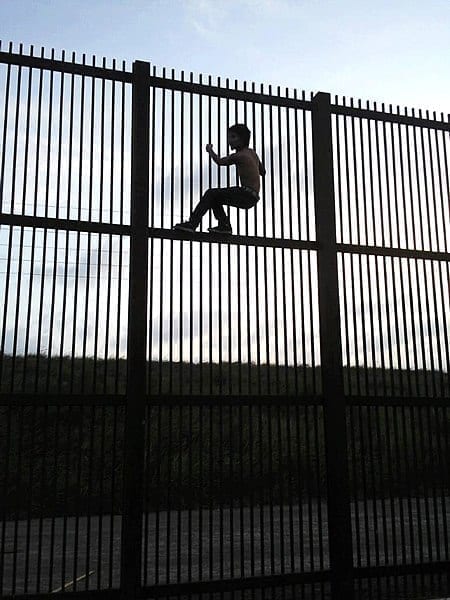No matter your gut reaction to reports of family separation at the border, there are some tough questions we must ask ourselves about them, and our future.
If you followed social media at all lately, it’s nearly impossible to have missed hearing about the family separation at the southern border. It seems like ages ago, but it was only mid-June when the Associated Press broke the story. Minors are being torn away from their parents and sent to detention facilities, some of which, in a twist reminiscent of Jade Helm conspiracy tales, are hollowed-out WalMart stores. The political left seethed with outrage that’s as predictable as it is deserved. They were joined by the United Nations, some religious denominations, and a smattering of Republicans who still possess what might be called a soul. Still, the swirling morass of social media isn’t the best place to engage in rational conversations about serious topics, and this topic, like every issue of importance, is complex.
As the administration flailed around to find the perfect magic words to defuse the public relations disaster, they piled excuse upon excuse. “It’s a deterrent” – but if so, wouldn’t it be more effective if it were publicized, rather than waiting to have it uncovered by good old fashioned investigative reporting? “The Democrats did it” – a bit of projection by a guilty administration. “God approves” – then why are so many people of faith appalled? “It’s a bargaining chip to build the Wall” – that Mexico was supposed to pay for, right? Legislation was suggested to end the crisis, from Ted Cruz’s pie-in-the-sky 14-day limit for processing asylum cases, to Trump’s executive order that will detain parents and children together but which turns a civil infraction into a criminal offense, possibly expediting family separation in the long run. Further, it does nothing to help the families already torn asunder.
It’s a horrid situation, rising like a pustule on our nation’s face. However, it didn’t come out of nowhere, and knowing the context woven in and around the events is helpful.
The United States has always had waves of anti-immigrant sentiment. Americans losing their jobs to the global economy only made the current wave stronger, and an influx of immigrants appearing to drive down wages made the working class more resentful of outsiders (even if the ancestors of those apparent outsiders have always lived here, or were dragged here unwillingly for profit) and the salaried class that benefits from an insecure and desperate work force. As “conservative” economic policies decimated the heartland, angry voters turned out in force for Donald Trump.
It’s also no secret that our population is growing older and less white. In 2016, deaths exceeded births among white people, the same year that voters in economically depressed areas and counties with more prescription opioid use per capita turned towards Trump, perhaps yearning for a half-mythical, bygone era, and a culture that feels like it’s slipping away.
While many religious organizations condemn family separation, conservative Christian groups remained most solidly in Trump’s corner. There may be a more nefarious reason for this than simple political loyalty. Adoption reform advocate Emm Paul fears that we’re setting up a new “baby scoop” era. Adoption is big business in the United States, and according to Paul, there are far more families, mostly evangelicals, who want to adopt babies than there are mothers willing to surrender their newborns. The border crisis seems tailor-made for supplying minimally documented, freshly scooped children, unbroken by the American foster care system (if you can call these children unbroken after being ripped from their parents and dumped in cold yet profitable detention centers around the country, that is). These children are not orphans, though, and the implications, like this 2012 case, are staggering.

However this ends up, both sides of the political debate are going to have some deep questions to mull over, if they’re being honest. Conservatives who support zero-tolerance policies like family separation should ask themselves why family values only matter when the families in question look like them. Then, consider what would be so bad at home that it’s worth the risk of losing your child in order to get away. I would also encourage them to mull over how great their country really is, if they support building a wall and separating families in order to protect their remaining crumbs.
Liberals, for their part, find it harder to deny the lack of opportunity that accompanies severe inequality, the effects that climate instability and natural disasters will bring, and the problems of overpopulation. Why, then, do they still believe there’s room for an endless stream of immigrants and asylum-seekers, quoting lines from Emma Lazarus’s New Colossus as if it were still 1883? Unless you count our decaying urban landscape and rural sacrifice zones, the United States hasn’t had an absorbent frontier for about 130 years. We can value intact, diverse families and eschew racist nationalism while still acknowledging that we’ve long overshot what our shrinking landbase can support, and that we’re unlikely to recreate the boom times that allowed us to assimilate the world’s wanderers.
Either way, unless this is the hill we’re choosing for the Republic to die upon, we’re all going to have to try harder to see from the other side’s perspective in order to come to some mutually acceptable policy that enables us to move forward. Are we interested in doing so any more?
Related: President Trump Does About-Face on Separation of Families Along Border


Join the conversation!